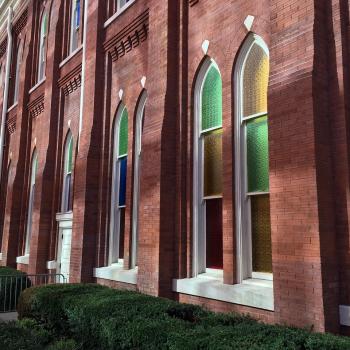At the final inquisition he remains virtually silent, until they proceed to strip him and fasten him to a torture device. Placing electrodes on his wrists, ankles, hips, and shoulders, they come to discover their dependency upon him even in this. It is only by his leave and knowledge that they can operate the machinery. His suffering has dignity, and his disciples, chief of whom is a female figure, bear him away to a place he has prepared for them—somewhere safe and far removed from the chaotic consequence that is the result of rejecting the Source of intelligibility in the world.
As an Armageddon ensues and the world descends into the chaos of its own rejection of order and reason, while in the company of those whom he chose out of the world, Galt pronounces a benediction as he traces the Sign of the Dollar over the world as it implodes. He then promises a new world dawning at the close of Atlas Shrugged.
Can all this be mere coincidence? No pope would be capable of issuing a more firm or irrevocable anathema than Rand were she to have heard my admittedly speculative comparison.
But I think it not so farfetched to imagine that a bright, young Alissa, first forming her own understanding of the world at a monumentally epic moment in history—Leningrad already awash in titanic conflict between the inestimable value of the individual human person vs. the Collective Man, between the competing icons of the Hammer and Sickle vs. Christ Pantocrator; the renowned Aristotelian N. O. Lossky, Alissa's first philosophy professor at the Petrograd University, introducing her to Aristotle and himself returning to Russian Orthodoxy at the time she would have been his student—that bright, imaginative, precocious, arrogant, frightened, and angry little girl—could have emerged into Ayn Rand. It is not hard to see the adult still retaining that swirl of ideas, iconographic images, memories, hopes, and despair, and nursing one hell of a grudge against the system (and anything to her mind like it) that destroyed her childhood world, her society, her culture, and her family.
Ayn Rand was nothing if not a contentious and controversial figure. She was not as clear a thinker as she thought herself to be (her arguments in favor of abortion are among the weakest on the market). Indeed, in her writings and public appearances she almost seemed to relish the offense she gave for her strident, brash, and relentless defense of reason, human freedom, and laissez-faire capitalism. If she ever suffered a fool gladly—if she ever suffered a fool at all—one would be hard pressed to find any record of it. She was the antithesis of Mother Teresa, and would have bragged about it.
I disagree profoundly with Rand; her attenuated definition of faith as unreason and her notion of sacrifice as wholly lacking dignity are unrecognizable to a Christian. Even her economics are better spelled out in Mises or Hayek. Her esthetic philosophy is paper thin and idiosyncratic; her malevolence toward children and the vulnerable is exceedingly distasteful.
For these and many more reasons, people who reverence Western Civilization must reject Rand. And yet, there is something in Rand that remains intriguing, and following years of pondering the question and speaking with others, I think I detect what people might see in her.
"Every man who knocks on the door of a brothel is looking for God." This is how G.K. Chesterton expressed the idea that there is in each heart an innate human thirst for beauty and Truth.
But it is unwise and unnecessary to merely dismiss out of hand Rand's ideas or the impact of her writings. It is especially off-putting to see the left employ images of her to tar and feather political opponents in a dishonest way very much reminiscent of the McCarthyism they so frequently denounce. They do not argue with Mr. Ryan—for their own ulterior motives, they merely associate him with an admittedly flawed and mean woman, and think they have done society a service.
The question Rand poses at the outset of Atlas Shrugged reveals more of this sad woman than I think even she realized. One can only pray that in the infinite mercy of the God in whom she did not believe, that Rand in the end may actually have found out who John Galt really is.




